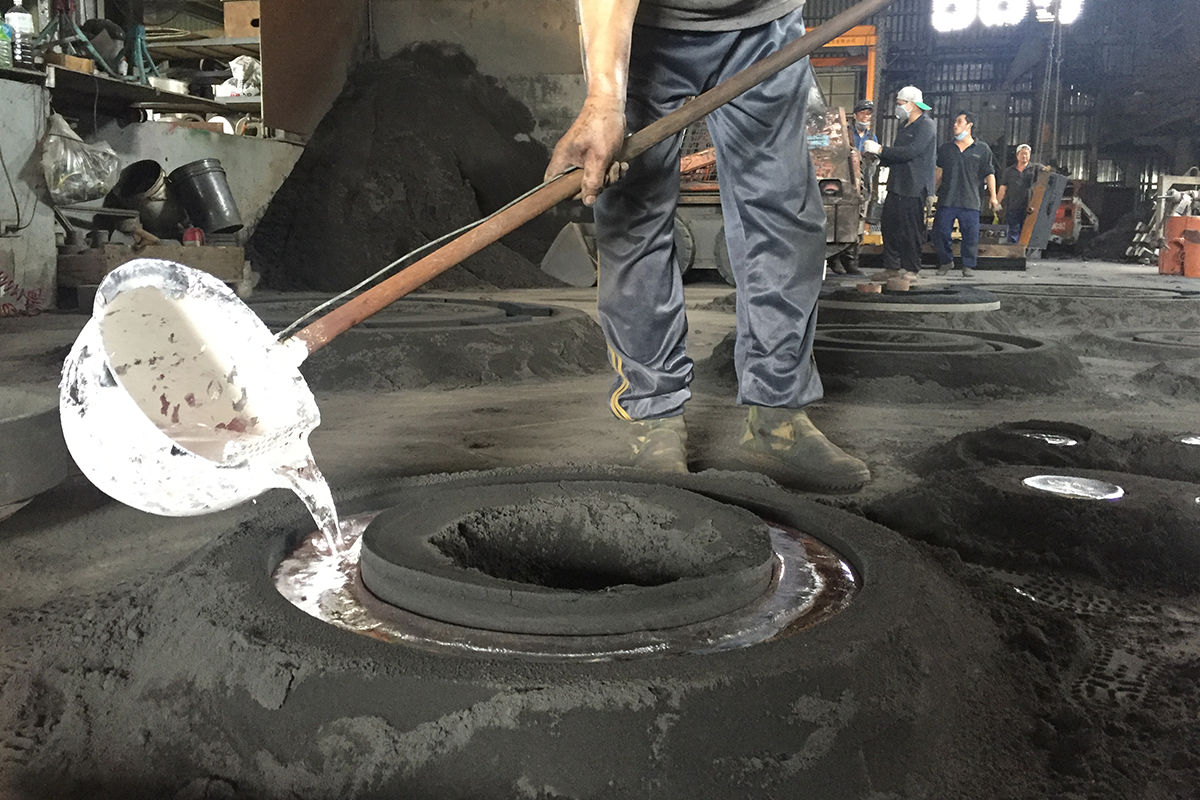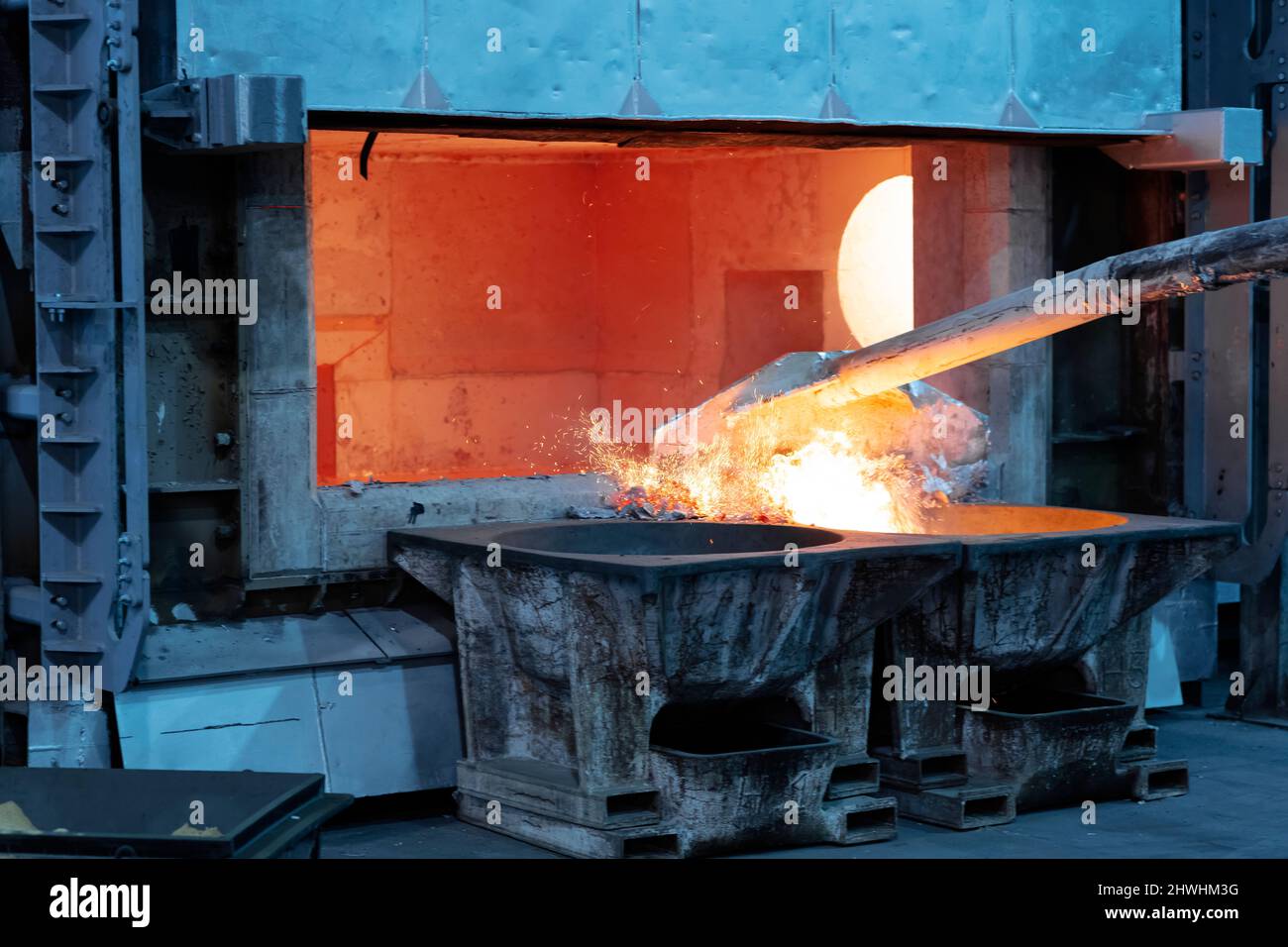Aluminum Foundry Wisconsin continues as a pillar of casting services
Wiki Article
Exactly How Aluminum Foundry Contributes to Developments in Aerospace Design
Aluminum foundries are indispensable to innovations in aerospace engineering. They create lightweight, high-strength components that are necessary for modern airplane. Via sophisticated spreading methods, these foundries produce complicated geometries that enhance structural stability. In addition, the growth of superior Aluminum alloys sustains the market's focus on gas performance and sustainability. Nonetheless, challenges continue to be in the manufacturing procedure. Comprehending these aspects discloses the extensive effect of Aluminum on aeronautics's future.The Relevance of Lightweight Products in Aerospace Design
As the aerospace industry proceeds to advance, the relevance of lightweight products becomes increasingly obvious. The need for performance and sustainability drives engineers to prioritize the use of products that minimize total weight without compromising structural honesty. Lightweight products, especially Aluminum, play an important function in boosting fuel efficiency, improving payload ability, and boosting the overall efficiency of aircraft.The integration of these products allows for innovative designs, making it possible for producers to create even more aerodynamic forms that can stand up to severe conditions. The decrease in weight not only reduces operational prices yet likewise contributes to a lowered ecological impact, straightening with worldwide efforts towards sustainability in aeronautics.
Advanced Casting Techniques in Aluminum Foundries
Advanced casting strategies in Aluminum foundries play an essential function in aerospace engineering by allowing the production of light-weight and accurate elements. Innovations in mold layout and accuracy spreading processes are vital in attaining suitable performance and structural stability. In addition, the advancement of light-weight alloys enhances the general efficiency and effectiveness of aerospace applications.Cutting-edge Mold Design
Ingenious mold design plays an important function in the effectiveness and efficiency of Aluminum shops, especially within the aerospace field. By leveraging sophisticated products and methods, modern mold and mildews can be crafted to endure heats and pressures, making sure peak performance during the casting procedure. These styles usually incorporate complicated geometries that permit the production of light-weight yet structurally audio components, vital for aerospace applications. Furthermore, the use of computer-aided design (CAD) software program promotes precise modeling, allowing shops to improve and replicate mold styles prior to physical production starts. This not only improves the top quality of actors parts yet likewise decreases waste and preparation, causing substantial expense savings. On the whole, ingenious mold layout is a cornerstone of progression in Aluminum Foundry modern technology for aerospace engineering.Accuracy Casting Processes
The performance of innovative mold and mildew styles perfectly incorporates with accuracy casting processes, which are important for producing premium Aluminum parts in aerospace design. These procedures, including sand spreading, pass away spreading, and investment spreading, ensure the creation of complex geometries with limited resistances. Advanced techniques like vacuum cleaner casting and pressure die casting enhance the integrity and surface area coating of the final items. Accuracy casting reduces product waste while maximizing the mechanical buildings of Aluminum, essential for aerospace applications. On top of that, employing real-time monitoring and progressed simulation devices throughout the casting process permits prompt changes, causing improved quality assurance. Jointly, these precision casting processes setting Aluminum foundries at the leading edge of aerospace innovation, supporting the industry's need for reliability and performance.Light-weight Alloy Advancement
As aerospace engineers look for to enhance fuel efficiency and efficiency, lightweight alloy advancement ends up being a crucial emphasis in Aluminum shops. These shops use advanced casting techniques to create alloys that supply remarkable strength-to-weight proportions. Technologies in alloy make-up, including the consolidation of components like lithium and magnesium, allow the production of materials that endure extreme conditions while decreasing overall aircraft weight. Methods such as die casting and investment spreading facilitate the precision manufacturing of complex shapes, which are crucial for aerospace applications. Furthermore, recurring research aims to maximize these alloys for improved mechanical homes and increased longevity. By prioritizing light-weight alloy growth, Aluminum factories substantially add to the advancement of aerospace design, leading the way for much more reliable and lasting airplane designs.
Enhancing Architectural Integrity Via Aluminum Elements
Aluminum parts use significant benefits in boosting structural stability within aerospace engineering. Their lightweight nature adds to general performance while maintaining toughness, which is vital for aircraft performance. Additionally, the anxiety resistance buildings of Aluminum aid guarantee the resilience and integrity of aerospace frameworks under different functional problems.
Lightweight Material Benefits
While typical materials usually compromise weight for stamina, utilizing Aluminum components in aerospace engineering supplies substantial benefits in structural integrity. Aluminum's light-weight nature adds to general style effectiveness, enabling for even more structured airplane that eat much less fuel, thereby improving sustainability. The product's exceptional strength-to-weight proportion warranties that components keep toughness without including unnecessary mass. This quality fosters enhanced performance and dexterity in trip, along with maximized payload abilities. Additionally, Aluminum's resistance to deterioration lengthens the lifespan of aerospace frameworks, minimizing maintenance prices and boosting safety. As manufacturers significantly embrace Aluminum alloys, the aerospace market experiences look at this now a transformative shift towards extra reliable and reliable engineering remedies that focus on both performance and ecological duty.Stress And Anxiety Resistance Properties
Although numerous materials have unique residential or commercial properties, Aluminum's remarkable stress resistance stands out as a critical consider enhancing the architectural honesty of aerospace elements. This resistance plays a crucial function in ensuring that airplane can withstand various operational stress and anxieties, including exhaustion, effect, and ecological conditions. Aluminum alloys, particularly crafted for aerospace applications, show high tensile strength while keeping lightweight attributes, making it possible for engineers to develop much more reliable structures - Aluminum Foundry. Additionally, the capacity of Aluminum to sustain cyclic loading without significant contortion contributes to the durability and integrity of aerospace parts. As advancements continue in Aluminum Foundry techniques, the advancement of stress-resistant Aluminum components guarantees further improvements in performance, safety, and performance throughout the aerospace market, solidifying Aluminum's duty as a preferred product in modern-day designFuel Effectiveness Improvements Driven by Aluminum Innovations
As the aerospace industry looks for to enhance fuel effectiveness, ingenious uses of Aluminum have emerged as a vital remedy. Aluminum's light-weight nature especially lowers aircraft weight, allowing for lower fuel usage throughout flight. This reduction in weight is important, as also tiny declines can lead to Visit Your URL considerable improvements in general gas economic climate.Advanced Aluminum alloys, created for boosted stamina and sturdiness, make it possible for producers to develop parts that keep architectural honesty while decreasing mass - Aluminum Foundry. In addition, the integration of Aluminum in airframes and engine elements facilitates enhanced the rules of aerodynamics, adding to minimized drag and enhanced effectiveness
The fostering of Aluminum in aerospace not only fulfills the need for fuel-efficient layout however likewise straightens with governing pressures for lower emissions. As these developments proceed to progress, they play a substantial role in setting new benchmarks for fuel performance, making certain that the aerospace industry can fulfill expanding financial and ecological challenges.

The Function of Aluminum in Sustainable Air Travel Practices
The raising focus on sustainable aeronautics techniques has actually placed Aluminum as a vital material in the quest for greener airplane design. Recognized for its lightweight residential properties, Aluminum substantially decreases aircraft weight, resulting in lower gas intake and exhausts. Its recyclability additionally enhances its sustainability account, as Aluminum can be recycled forever without loss of quality. This characteristic supports a round economic climate within the aviation market, lessening waste and source depletion.Furthermore, innovations in Aluminum alloys have enhanced their toughness and corrosion resistance, enabling longer service life and lowered upkeep requirements. These advancements facilitate the growth of much more reliable aircraft frameworks, adding to total sustainability efforts. In addition, Aluminum's thermal conductivity plays a critical function in energy-efficient designs, boosting systems such as warmth exchangers. Jointly, these attributes highlight Aluminum's pivotal function beforehand lasting air travel, straightening with worldwide efforts focused on lowering the environmental influence of flight.
Obstacles Dealt With by Aluminum Foundries in Aerospace Manufacturing
While Aluminum factories play a vital duty in aerospace manufacturing, they encounter significant obstacles that can influence production efficiency and quality. my link One significant challenge is the strict top quality control standards called for in the aerospace sector. Any kind of problem can jeopardize security and efficiency, demanding rigorous examination processes that prolong manufacturing timelines. Furthermore, shops frequently contend with fluctuating resources costs, which can influence prices and productivity. The intricacy of Aluminum alloys utilized in aerospace applications more complicates the manufacturing process, as precise formulas are essential for accomplishing desired mechanical residential or commercial properties. Additionally, skilled labor lacks hinder the capacity to keep top quality manufacturing levels. Lastly, ecological policies impose constraints on discharges and waste management, calling for shops to invest in sustainable practices, which can be cost-prohibitive. These aspects jointly produce a landscape where Aluminum factories must constantly adjust to satisfy the progressing needs of aerospace manufacturing while making certain safety and compliance.Future Patterns in Aluminum Applications for Aerospace Design
With innovations in technology and increasing demands for effectiveness, the future of Aluminum applications in aerospace design is poised for significant transformation. The combination of innovative Aluminum alloys and compounds is expected to improve strength-to-weight proportions, bring about even more fuel-efficient aircraft styles. In addition, innovations in additive manufacturing techniques will certainly enable for the production of complicated Aluminum structures that were previously impossible, enhancing performance and reducing waste.
Lasting practices will certainly play an essential duty, with a growing emphasis on reusing Aluminum to minimize environmental impact. The aerospace industry is likely to embrace smarter manufacturing procedures, such as automation and man-made knowledge, ensuring higher quality and accuracy in Aluminum parts. Moreover, partnerships in between Aluminum factories and aerospace companies will certainly cultivate r & d, paving the way for brand-new applications that fulfill the rigorous demands of modern aerospace design - Aluminum Foundry. Overall, the future looks promising for Aluminum's duty fit the skies
Often Asked Inquiries
What Are the Ecological Influences of Aluminum Manufacturing in Aerospace?
The ecological impacts of Aluminum manufacturing in aerospace include substantial energy usage, greenhouse gas emissions, and habitat interruption. Additionally, mining procedures can cause soil degradation and water contamination, raising issues about sustainability and environmental equilibrium.Exactly How Does Aluminum Contrast to Various Other Materials in Aerospace Applications?
Aluminum offers a distinct mix of lightweight homes, deterioration resistance, and cost-effectiveness contrasted to various other materials. Its high strength-to-weight ratio makes it particularly helpful for aerospace applications, improving gas efficiency and general performance in aircraft layout.What Certifications Do Aluminum Foundry Employees Need for Aerospace Projects?
Aluminum Foundry employees need specialized training in metallurgy and casting techniques, together with understanding of aerospace sector standards. Accreditations in high quality control and safety and security methods are likewise important to assure compliance with rigorous aerospace job needs.Are There Any Kind Of Safety And Security Interest In Utilizing Aluminum in Aerospace Design?
Security concerns relating to Aluminum in aerospace design include susceptibility to stress and anxiety, tiredness, and rust cracks. Proper treatment and alloy option are necessary to reduce these threats, guaranteeing architectural stability and general safety and security in aerospace applications.Exactly How Does Aluminum Recycling Advantage the Aerospace Industry?
Aluminum recycling substantially benefits the aerospace industry by reducing material expenses, decreasing environmental impact, and saving energy. This lasting method boosts the industry's effectiveness while promoting making use of lightweight, high-performance parts in airplane manufacturing.Advanced spreading strategies in Aluminum factories play a critical role in aerospace engineering by enabling the manufacturing of light-weight and accurate parts. Ingenious mold and mildew style plays a vital function in the performance and effectiveness of Aluminum foundries, especially within the aerospace field. As aerospace engineers look for to improve fuel efficiency and performance, lightweight alloy growth comes to be an important emphasis in Aluminum shops. Aluminum alloys, specifically engineered for aerospace applications, show high tensile toughness while maintaining light-weight characteristics, enabling designers to develop much more effective frameworks. Partnerships in between Aluminum shops and aerospace business will cultivate study and development, paving the means for new applications that fulfill the rigid requirements of modern aerospace design.
Report this wiki page